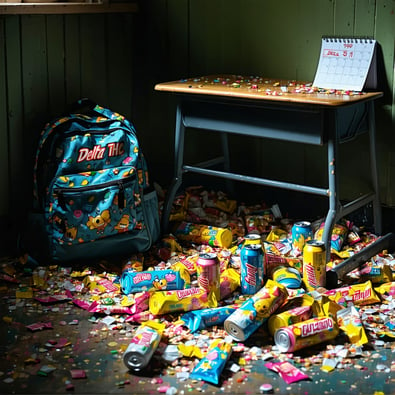Governor Murphy Signs Law Closing Hemp Loophole, Halting Sale of THC Products Until Regulations Are Drafted.
In one fell swoop, the loophole that allowed intoxicating hemp products — from candy-shaped edibles and cannabis flower available at gas stations to the THC seltzers on liquor store shelves — has been closed off.
Gov. Phil Murphy on Thursday signed into law a bill establishing regulations for intoxicating hemp products, placing their manufacturers and retailers under the purview of the New Jersey Cannabis Regulatory Commission, the state authority already charged with overseeing the state's legal weed and medical marijuana industries and markets.
The cannabis commission will be charged with drafting rules and regulations for intoxicating hemp products, such as testing and labeling standards.
But, crucially, it will grind the production and sale of those products to a halt until those regulations are created, which the law says must occur within 180 days. Intoxicating hemp products — including the massively popular THC seltzers — must be pulled off shelves within the next 30 days, after which only retailers approved or licensed by the Cannabis Regulatory Commission will be allowed to sell or distribute them.
"These products are sold outside of the regulated market for cannabis even though they can have similar effects, may contain harmful chemicals and other contaminants, and often are sold without appropriate testing and labeling," Murphy said in a statement accompanying his signature. "Too frequently, these products are readily available to minors. The status quo is untenable and this bill will put an end to it."
When they are put back up for sale, only adults over 21 years old will be allowed to purchase them. And those sales will be subject to both state sales tax and any local transfer tax, an additional levy of up to 2% municipalities can impose on cannabis sales.
While the new hemp law slams the door shut on the hemp loophole, there are still murky questions about its effect and enforcement: While police departments can shut down retailers illegally selling products, how can they enforce the law against online, out-of-state retailers? How will the Cannabis Regulatory Commission take on the burden of regulating an entirely new series of products without any additional funding (Murphy himself called out this issue after signing the bill into law)?
And, crucially, how does it gel with federal law regulating hemp?
In his statement accompanying the signed bill, Murphy expressed similar reservations — calling particular attention to unclear language in the bill that would either completely exempting any New Jersey-made intoxicating hemp products or declaring illegal any product not made in New Jersey, even those manufactured within the state — which would fly in the face of federal law.
The loophole explained
Hemp was federally legalized as part of the 2018 Farm Bill, which draws a legal distinction between marijuana and hemp, which must contain less than 0.3% THC. The farm bill led to a booming CBD market but, soon, shrewd manufacturers realized they could create products that would get consumers just as intoxicated as marijuana with only the trace amounts of THC.
In essence, it became possible to grow, manufacture and sell legal weed without jumping through any of the hoops licensed cannabis businesses must follow, such as age restrictions or testing standards. They could be even be sold in towns that specifically opted out of allowing any legal weed businesses within their borders.
And unlike legal weed, which is still illegal on the federal level, intoxicating hemp products could be sold across state lines.
The push for the state to address intoxicating hemp products changed dramatically over time, morphing from an effort to simply ban such products to prohibiting their sale to children to the bill that eventually passed in June. It became a three-way tug-of-war between the cannabis, hemp and liquor industries.
Cannabis stakeholders felt it was unfair for any retailer to sell products without also following the Cannabis Regulatory Commission's myriad regulations, especially liquor stores. Murphy echoed those concerns in his statement accompanying the bill, calling on commissioners to adopt regulations for alcohol licensees that are "comparable" to those adopted for cannabis businesses.
Liquor stakeholders hoped to protect their new cash cow, the THC seltzers that already make up about 10% to 15% of all liquor sales in the state.
And hemp stakeholders who followed safety standards on their own accord — like not selling to children and only selling products that underwent testing —felt like they were collateral damage as legislators targeted less scrupulous retailers.
"We are good actors. We followed the process the state put forward to enter this business. They've required us to get expensive warehouse space. We followed the state's process. We made all the investments, like they asked. And here we are" said Philip Petracca, owner of THC drink startup Bella Ray Beverage, based in Asbury Park. "For us, it's economically devastating."
Petracca said he's invested more than $1.5 million into Asbury Park-based Bella Ray.
"Everybody is on board with taking the unregulated, untested synthetic THC products off the market. But that's not what they did," said Petracca, who also cofounded Source Farmhouse Brewery Colts Neck. "What they did was kill the hemp industry."
Murphy said he signed the bill after becoming convinced that his suggested revisions wouldn't have the "broad support necessary to move through the Legislature quickly.
"Unlike many issues, the status quo poses an immediate risk to health and safety, as these unregulated intoxicating hemp products are widely available to minors," Murphy said. "Because the bill would address this present danger, I have concluded that the wiser course is to sign the bill now and commit to working with the Legislature to address the technical issues and other challenges in separate legislation."





